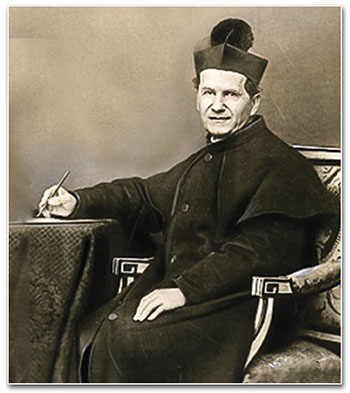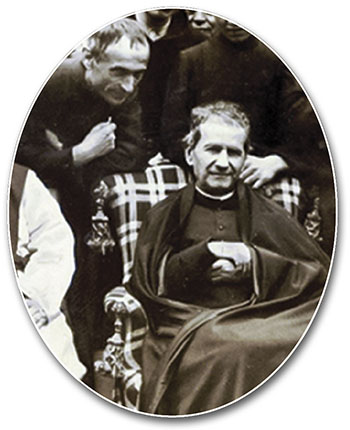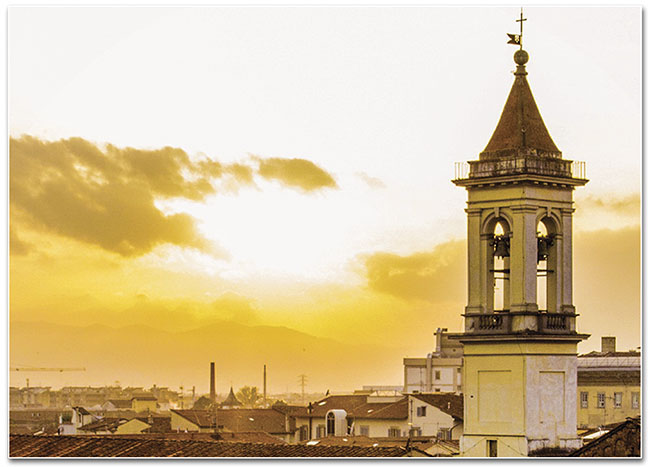The continuation and perpetuity of a Religious Order depends to a great extent on the actions of its members and their fidelity towards the person chosen by the Holy Spirit to establish a new charism in the Church. Accordingly, throughout the history of foundations, God does not fail to raise up men who are excellent reflections of their masters and who continue their work.
Like the tower of a church in a metropolis, forgotten amidst the gigantic skyscrapers and dreadful cacophony, but which announces its presence by the tolling of the bell it houses, in this way the founder sees projected and perpetuated, through his disciples, the providential mission to which he was called.
We encounter a beautiful proof of this reality in the life of Blessed Michael Rua: he was like the bell that reverberated far and wide the spirit and mentality of St. John Bosco, founder of the Salesian Congregation.

In fact, a Capuchin friar who knew him once said: “I have seen a miracle: Don Bosco is risen! Rua is not only the successor of Don Bosco, he is another Don Bosco. The same gentleness, the same humility, the same simplicity, the same grandeur of soul, the same joy that radiates around him. Everything in the life and works of Don Bosco is miraculous. However, this perpetuity of himself in Don Rua seems to me the greatest of all miracles.”1
The early years
Turin was the birthplace of Michael Rua. Born on June 9, 1837, the last child of John Battista Rua’s second marriage to Giovanna Maria Ferrero, he was the youngest of a family of fervent Catholics, as attested by his Baptism, which took place only 48 hours after his birth.
John Battista was a hardworking, honest and very intelligent man, which is why he had a good job at the Royal Armaments Factory in Borgo Dora, a small district of the Piedmontese capital. Within the factory complex itself, he procured a home for his family. It was here that little Michael grew up and studied, with a chaplain as teacher and catechist and the children of the other workers as his companions.
At the age of eight, the boy was ready for his First Communion. However, a cloud overshadowed the blue sky of that family: on August 2, 1845, that excellent father and faithful husband died. Curiously – or providentially! – a month after the death of his progenitor, the young orphan met another John…
Memorable encounter
The Oratory founded by Fr. John Bosco, dedicated to the education and religious formation of poor children, was already well known in the populous Turin of the time.
One day Raimondo Battista, one of Michael’s companions in the little school at the Royal Armaments Factory, was wearing a beautiful tie that he had bought at a party at the Oratory. This led to an enthusiastic conversation about Don Bosco, that blessed place, the games and the boys… And Michael was quick to accompany his friend the following Sunday.
When he arrived, the Saint approached to greet him, and after some warm words of welcome, he invited Michael to frequent the Oratory. The famous priest was held in high esteem and, notwithstanding his jovial character, everything he did had profound meaning. Everyone knew that!
On one occasion in 1847, little Michael, barely ten years old, approached the Saint to receive the medals and holy cards that he used to distribute to the boys. Don Bosco, in no hurry to hand them over, pretended not to understand the request and merely smiled and joked, placing his biretta on the young boy’s head.
But Michael insisted:
“A holy card! A holy card, please!”
At that moment Don Bosco held up a holy card in the palm of his left hand and with his right he marked out the middle of the card, as if he were dividing it, and smiling he said:
“Take it, little Michael, take it! We two will go ‘halves’”!
The scene was repeated several times, and young Rua wondered what that gesture and those words meant…
First pillar of the Salesian foundation
From these first encounters, St. John Bosco mysteriously discerned that little Michael was destined to be his principal helper in the congregation he was to found. A relationship that would last forever had begun.
Rua became Don Bosco’s secretary, a fact that allowed him to closely follow the laborious life of his spiritual father. His fascination and admiration led him to take notes, like an amanuensis, of his every word and deed, so that nothing would be overlooked.
Thanks to these notes we can learn how the great Saint of Turin, in the manner of the Divine Redeemer, was concerned with outlining the Salesian rule first in souls, and only afterwards on paper.
This is what Michael Rua wrote in January 1854 when he was still an adolescent: “Rocchietti, Artiglia, Cagliero and I gathered in Don Bosco’s room. He proposed that we undertake a trial in the practical exercise of charity toward our neighbour. Afterwards we would make a promise in this regard and then a vow. Those who complete this trial and those who make it later will receive the name of Salesians.”2
This was how the Salesian Congregation began, and Don Rua seems to have opened the way for those who would pass the “exam”. On March 25, 1855, at the invitation of Don Bosco, he alone took the vows of obedience, chastity and poverty. Officially, the Salesian society had welcomed its first child! Upon that eighteen-year-old young man, the Founder laid the foundations of his work.
“We two will go halves” is fulfilled to the letter

If it were possible to recount the prodigious work of Don Rua at Don Bosco’s side, pages upon pages would be filled.
From the time he was a young frequenter at the Oratory, Michael was entrusted, on the initiative of St. John Bosco, with the care of the other boys. As he grew older and was formed, these responsibilities only increased. Each day he became more and more the longa manus of his spiritual father.
When it was necessary to revive the Salesian spirit somewhere, Don Bosco sent Don Rua. When it was necessary to undertake a journey for the benefit of the institute, to found a new house, to revitalize or reorganize those already existing, the task also fell to him. Little by little, the Saint was passing on to his beloved son the tasks that were his exclusive responsibility as founder, in order to show everyone with whom he wished to leave his commander’s staff.
Don Rua, for his part, gifted with great energy of soul, and above all, with an ardent love for the master that God had given him, took on all that was entrusted to him with a boundless readiness. From his very first mission, the foundation of a Salesian house at Mirabello Monferrato, which was also in the Piedmont region, he revealed the secret that would always crown his undertakings with success: “At Mirabello I will try to be Don Bosco.”3 And so it was!
Don Rua in Don Bosco’s estimation
“If the Lord told me that I was going to die soon and that I should choose a successor, requesting on his behalf all the qualities and virtues that I wished him to have, I assure you that I would not know what to ask God, because I can see that Don Rua already has all of this.”4 The charismatic founder of the Salesians uttered these words when his disciple was only thirty years old. He was proud of that son. Don Francesia – a contemporary of both at the Oratory – wrote that the young man conquered Don Bosco’s heart from an early age.
It is amazing that a founder could make such statements about a member of his spiritual family. God rewarded the great Don Bosco by giving him not only a son, a follower, a disciple and a friend, but “another himself”.
Blessed Michael Rua’s personality
How true is St. Paul’s affirmation that “star differs from star” (1 Cor 15:41). Although Don Rua was acclaimed by his contemporaries as another Don Bosco, some of his personal characteristics were very different from those of his master. In this sense his mission also consisted in completing him. In fact, the distinction between the two did not separate, but unite them in view of the realization of God’s plan for them and for the Salesian work.
There is unanimous recognition of the qualities of Michael Rua: a man of noble character, upright conscience, acute intelligence and a prodigious memory, a gifted organizer, but above all, of a humble soul overflowing with faith.
His countenance was cheerful, his presence discreet, and his spirit was perpetually serene. His heart, however, was ardent and his horizons vast! His ability to manage and simultaneously carry through a series of undertakings gave him a marked note of determination.
His good humour was also evident, even in the most difficult moments. On April 2, 1910, for example, four days from death – and therefore in serious condition and probably suffering atrocious pain – Don Rua asked those assisting him:
“When I die, where will I be laid?”
They were at a loss to respond to this disconcerting question, until the spiritual director of the congregation, Don Pablo Álbera, spoke up:
“We don’t think about that. We are asking for your cure and for you to continue doing all the good that you do.”
Rua insisted, but, realizing the discomfort of his interlocutor, he explained jokingly:
“I asked this question so I would know where I should go to collect my poor ashes when the Universal Judgement comes. I might look for them in the wrong place, and then start going around in circles…”
That is how Don Rua was: so different from and at the same time so much another John Bosco!
A bond that even death respected
It was 1868. The famous Salesian Congregation was growing, the work was only increasing and the influx of members of the Institute on the occasion of the inauguration of the Church of Mary Help of Christians was immense. Rua was not in good health. Making little of his illness, he carried out his duties as usual, always repeating the phrase that had become famous on his lips: “Everything for the Lord! May His holy will be done!”5 One day, however, the illness showed signs of winning the duel: he seemed to be at death’s door, and his spiritual father was absent.
On hearing of the grave condition of his beloved son, Don Bosco said, in an almost light-hearted tone, “Don Rua, do not leave without my permission.”6 And he calmly went to supper. Afterwards he went to the bed of the sick man who in a weak voice entreated:
“Don Bosco, give me your blessing and the Holy Oils without delay, for my last moment has come.”
“Be at peace! Are you thinking of departing without my permission? There are still many things for you to do.”
As the sick man insisted, he repeated:
“Do not worry, my son, for you well know that Don Rua will do nothing without Don Bosco’s consent.”
Against all human hope, the illness vanished. Little by little, the physical vigour returned to the disciple who was soon able to resume his active routine for another forty-one years.
Rua died on April 6, 1910, at the age of seventy-two. After taking over the direction of the Salesian Congregation in 1888, he saw its members grow from a little over seven hundred to four thousand, spread throughout thirty-three countries.
The most outstanding virtue in Michael Rua
At the end of these considerations, it is inevitable that we should want to identify the primary virtue practised by Blessed Michael Rua – the one that sums up his days on this earth. His very life, however, answers this question: admiration for St. John Bosco!
This virtue was his lifeblood: on the wings of admiration he soared in the immense heavens of his father and founder’s soul; through it he loved and understood him; impelled by it he worked tirelessly for the salvation of the young; because he possessed it he remained serene in trials, determined in struggles and constant in victories; by its means, finally, he came to be a complement and support to his master.
Not without reason a biographer comments on Michael Rua and his fundamental support for Don Bosco: “Present from the beginning of the Salesian work, Don Rua captured its intrinsic potential for growth and developed it with coherence and creativity. The intuitions of the charismatic founder were converted by Don Rua into an institution. Don Bosco ‘dreamed’ big, and Don Rua realized his dream. Don Bosco ‘revealed’, and Don Rua gave the practical instructions. […] Don Bosco ‘invented’ his Oratory, and Don Rua enriched it with new modalities. Don Bosco introduced the Salesians to works specifically for young people, and Don Rua led them along new paths.”7

In effect, the admiration of Don Rua was the bell that made it possible for the Salesian tower to call out to the society of his time. Without hesitation, one can believe that Don Bosco was victorious because he had a Michael Rua! ◊
Notes
1 ARAGÓN RAMÍREZ, SDB, Miguel. Beato Miguel Rua. El salesiano número uno. Madrid: CCS, 2012, p.20.
2 Idem, p.58.
3 Idem, p.83.
4 Idem, p.222.
5 Idem, p.229.
6 FRANCESIA, SDB, Juan Bautista. Memorias biográficas de Don Miguel Rúa, primer sucesor de Don Bosco. Buenos Aires: Colegio Pío IX de Artes y Oficios, 1912, p.95.
7 ARAGÓN RAMÍREZ, op. cit., p.21.


